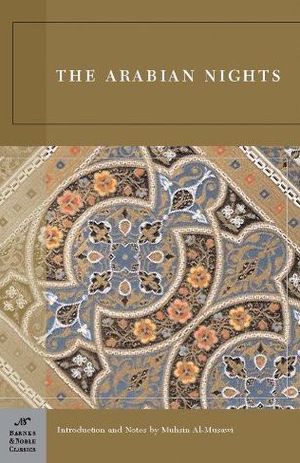Arabian Nights · Barnes & Noble Classics Series

- Authors
- Anonymous
- Publisher
- Barnes&Noble
- Tags
- fantasy , classics
- ISBN
- 9781593082819
- Date
- 0800-01-01T00:00:00+00:00
- Size
- 20.16 MB
- Lang
- en
The original concept is most likely derived from a pre-Islamic Persian prototype that probably relied partly on Indian elements, but the work as we have it was collected over many centuries by various authors, translators and scholars across the Middle East and North Africa. The tales themselves trace their roots back to ancient and medieval Arabic, Persian, Indian, Egyptian and Mesopotamian folklore and literature. In particular, many tales were originally folk stories from the Caliphate era, while others, especially the frame story, are most probably drawn from the Pahlavi Persian work Hazār Afsān. Though the oldest Arabic manuscript dates from the 14th century, scholarship generally dates the collection's genesis to around the 9th century.
Some of the best-known stories of The Nights, particularly "Aladdin's Wonderful Lamp", "Ali Baba and the Forty Thieves" and "The Seven Voyages of Sinbad the Sailor", while almost certainly genuine Middle-Eastern folk tales, were not part of The Nights in Arabic versions, but were interpolated into the collection by its early European translators. (From wikipedia)
*The Arabian Nights*, by **Anonymous**, is part of the *Barnes some include illustrations of historical interest. *Barnes & Noble Classics *pulls together a constellation of influences—biographical, historical, and literary—to enrich each reader's understanding of these enduring works.
Once upon a time, the name Baghdad conjured up visions of the most magical, romantic city on earth, where flying carpets carried noble thieves off on wonderful adventures, and vicious viziers and beautiful princesses mingled with wily peasants and powerful genies. This is the world of the *Arabian Nights*, a magnificent collection of ancient tales from Arabia, India, and Persia.
The tales—often stories within stories—are told by the sultana Scheherazade, who relates them as entertainments for her jealous and murderous husband, hoping to keep him amused and herself alive. In addition to the more fantastic tales which have appeared in countless bowdlerized editions for children and have been popularized by an entire genre of Hollywood films, this collection includes far more complex, meaningful, and erotic stories that deal with a wide range of moral, social, and political issues.
Though early Islamic critics condemned the tales’ “vulgarity” and worldliness, the West has admired their robust, bawdy humor and endless inventiveness since the first translations appeared in Europe in the eighteenth century. Today these stories stand alongside the fables of Aesop, the fairy tales of the Brothers Grimm, and the folklore of Hans Christian Andersen as some of the Western literary tradition’s most-quoted touchstones.
**Muhsin J. Al-Musawi** is Professor of Arabic Studies at Columbia University in New York City and University Professor at the American University of Sharjah. He is the editor of the *Journal of Arabic Literature* and the author of twenty-seven books in Arabic and English. He was the recipient in 2002 of the Owais Award in literary criticism, the most prestigious nongovernmental literary award in the Arab World.